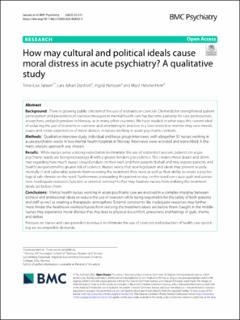| dc.contributor.author | Jansen, Trine-Lise | |
| dc.contributor.author | Danbolt, Lars Johan | |
| dc.contributor.author | Hanssen, Ingrid | |
| dc.contributor.author | Hem, Marit Helene | |
| dc.date.accessioned | 2022-10-20T11:21:28Z | |
| dc.date.available | 2022-10-20T11:21:28Z | |
| dc.date.created | 2022-04-10T14:03:05Z | |
| dc.date.issued | 2022 | |
| dc.identifier.citation | BMC Psychiatry. 2022, 22, 1-11 | en_US |
| dc.identifier.issn | 1471-244X | |
| dc.identifier.uri | https://hdl.handle.net/11250/3027294 | |
| dc.description | This article is licensed under a Creative Commons Attribution 4.0 International License, which permits use, sharing, adaptation, distribution and reproduction in any medium or format, as long as you give appropriate credit to the original author(s) and the source, provide a link to the Creative Commons licence, and indicate if changes were made. The images or other third party material in this article are included in the article’s Creative Commons licence, unless indicated otherwise in a credit line to the material. If material is not included in the article’s Creative Commons licence and your intended use is not permitted by statutory regulation or exceeds the permitted use, you will need to obtain permission directly from the copyright holder. To view a copy of this licence, visit http://creativecommons.org/licenses/by/4.0/. The Creative Commons Public Domain Dedication waiver (http://creativeco mmons.org/publicdomain/zero/1.0/) applies to the data made available in this article, unless otherwise stated in a credit line to the data. | en_US |
| dc.description.abstract | Background: There is growing public criticism of the use of restraints or coercion. Demands for strengthened patient participation and prevention of coercive measures in mental health care has become a priority for care professionals, researchers, and policymakers in Norway, as in many other countries. We have studied in what ways this current ideal of reducing the use of restraints or coercion and attempting to practice in a least restrictive manner may raise morals issues and create experiences of moral distress in nurses working in acute psychiatric contexts.
Methods: Qualitative interview study, individual and focus group interviews, with altogether 30 nurses working in acute psychiatric wards in two mental health hospitals in Norway. Interviews were recorded and transcribed. A the matic analytic approach was chosen.
Results: While nurses sense a strong expectation to minimise the use of restraints/coercion, patients on acute psychiatric wards are being increasingly ill with a greater tendency to violence. This creates moral doubt and dilem mas regarding how much nurses should endure on their own and their patients’ behalf and may expose patients and healthcare personnel to greater risk of violence. Nurses worry that new legislation and ideals may prevent acutely mentally ill and vulnerable patients from receiving the treatment they need as well as their ability to create a psycho logical safe climate on the ward. Furthermore, persuading the patient to stay on the ward can cause guilt and uneasi ness. Inadequate resources function as external constraints that may frustrate nurses from realising the treatment ideals set before them.
Conclusions: Mental health nurses working in acute psychiatric care are involved in a complex interplay between political and professional ideals to reduce the use of coercion while being responsible for the safety of both patients and staf as well as creating a therapeutic atmosphere. External constraints like inadequate resources may further more hinder the healthcare workers/nurses from realising the treatment ideals set before them. Caught in the middle nurses may experience moral distress that may lead to physical discomfort, uneasiness and feelings of guilt, shame, and defeat. Pressure on nurses and care providers to reduce or eliminate the use of coercion and reduction of health care spend ing are incompatible demands. | en_US |
| dc.language.iso | eng | en_US |
| dc.publisher | BioMed Central | en_US |
| dc.rights | Navngivelse 4.0 Internasjonal | * |
| dc.rights.uri | http://creativecommons.org/licenses/by/4.0/deed.no | * |
| dc.subject | mental health nursing | en_US |
| dc.subject | psychiatric nursing | en_US |
| dc.subject | political ideals | en_US |
| dc.subject | cultural ideals | en_US |
| dc.subject | coercion | en_US |
| dc.subject | acute psychiatry | en_US |
| dc.subject | moral distress | en_US |
| dc.title | How may cultural and political ideals cause moral distress in acute psychiatry? A qualitative study | en_US |
| dc.type | Peer reviewed | en_US |
| dc.type | Journal article | en_US |
| dc.description.version | publishedVersion | en_US |
| dc.rights.holder | © The Author(s) 2022 | en_US |
| dc.source.pagenumber | 1-11 | en_US |
| dc.source.volume | 22 | en_US |
| dc.source.journal | BMC Psychiatry | en_US |
| dc.identifier.doi | 10.1186/s12888-022-03832-3 | |
| dc.identifier.cristin | 2016475 | |
| dc.source.articlenumber | 212 | en_US |
| cristin.ispublished | true | |
| cristin.fulltext | original | |
| cristin.qualitycode | 2 | |

